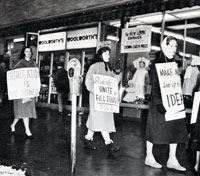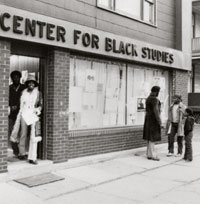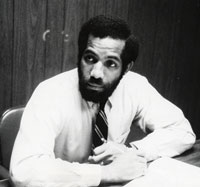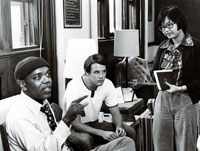The History of Africana Studies at Vassar College
by Ismail Rashid, Associate Professor of History and Africana Studies
March 2011
Program Website
As with many colleges and universities across the United States, the Africana Studies Program at Vassar College traces its origins to student demands and protests for inclusion of knowledge of peoples of African descent in the college’s curriculum. In 1969, the Black Studies department was created after thirty-four African-African female students occupied the Vassar College Main Building demanding amongst other things, the teaching of more courses relating to the black experience, the creation of a program awarding a major in Black Studies, and the hiring of more black faculty. The protest divided the student population, with the majority of white students supporting the demands of the African American students; it also generated a storm of unwanted media publicity for the college. After initially refusing to dialogue with the protesting students, Vassar College president, Alan Simpson, and the Vassar Board of Trustees eventually set up the Caitlin Commission, which recommended the college’s acceptance and implementation of all their demands.
In Fall 1969, the new Black Studies Program headed by Dr. Milfred Fierce, and housed at the Urban Center for Black Studies in the city of Poughkeepsie, became an integral part of the Vassar College curriculum. In 1974, the academic division of Black Studies was moved to campus, becoming the first multidisciplinary program to occupy the New England Building, now home to most of the campus's multidisciplinary programs. In 1975, the Black Studies department changed its name to the Africana department. This change was intended to reflect more accurately the scope of academic inquiry encompassing the study of people of African ancestry in Africa and the Diaspora. Since then, Dr. Norman Hodges, Dr. Larry Mamiya, Dr. Joyce Bickerstaff, Dr. Constance Berkeley, Dr. Obika Gray, Dr. Gretchen Gerzina, Dr. Judith Weisenfeld, Dr. Tim Longman, Dr. Lisa Paravisini, and Dr. Ismail Rashid have served as directors of the program.
In 1979, the Vassar Greenhaven Prison Program, led by professor of religion and Africana Studies Lawrence Mamiya, began as a weekly dialogue on current events between Vassar students and inmates at the maximum-security prison in Stormville, NY. The program has evolved into a broader educational experience for both students and inmates, confronting issues such as race, class, stereotypes, and economic opportunity. Many of the Vassar students have gone on to work with other prison education programs, and since 1999 an annual reunion has brought together Vassar alumnae/i and former Greenhaven inmates for conversation.
During the 1980s and 1990s, Africana Studies operated with a committee of core faculty plus other “participating faculty,” faculty not appointed in Africana but teaching in the program, with authority primarily over programming. In the early 90s, for the first time the program began to offer students the opportunity to spend their Junior Year Abroad Experience at a Historically Black College or University. With the support of the office for international studies, it also initiated a study-away program at Mohammed V University in Morocco.
During the 2001-2002 school year, a major revision of the Curriculum was undertaken. This revision attempted to take into account both changes in the discipline and changes in our own faculty and course offerings. Two required courses were eliminated, reflecting in part the fact that these requirements were often waived for students. Three new areas of study were defined: Intellectual History and Political Thought; Migration and Area Studies; and Arts, Culture, and Media. Students are required to take courses in each area and to specialize in one. Since 2004, the program reinstated a monthly faculty Seminar Series, titled, “Diasporic Dialogues,” which has provided a forum for faculty and administrators from within and outside the college to present their research and works-in-progress. Another major revision of the Program’s curriculum occurred in 2005-2006, and more emphasis was placed students exploring the breadth of the Afro-Diasporic and disciplinary richness of our curriculum by taking courses on different regional as well as the different divisional specialties in the program. It was agreed that three key courses: The Africana Research Methods, Black Intellectual History and Senior Thesis\Project should be required and should anchor the experience of graduating Africana student majors. The Program also delineated three areas of specialization in the general correlate sequence, Africa, African-American and Caribbean, and it instituted a new correlate sequence in Arabic Language and Culture. Since 2004, the program has offered Arabic as a regular rather a self-instructional course.
In 2008-2009, the program celebrated 40 years of existence, with a year-long events of lectures and cultural events culminating in a major conference and exhibition in April 2009 on the theme, “African Identities In The Diaspora: Academic Excellence/Social Responsibility. Drawing from a wide range of faculty, Africana Studies at Vassar has offered, and continues to offer a uniquely comprehensive interdisciplinary curriculum, covering the fields of Arabic, art, anthropology, drama, education, film, geography, history, literature, music, political science, religion, and sociology. In its four decades of existence, the program has also brought to campus, several distinguished and well-known black scholars, artists, musicians, and activists.
References
Daniels, Elizabeth, Vassar Encyclopedia (online)
Claudia Lynn Thomas, “Takeover of Main Building, 1969,” Vassar Encyclopedia (online)
Joshunda Sanders, “Making History: 40 Years of Africana Studies at Vassar, Vassar Quarterly, Spring 2009 Volume 105 Issue 2. (Accessed May 9, 2010).




